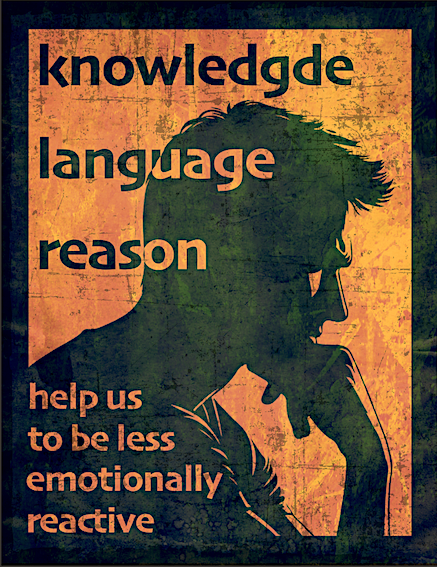emotions are limitations
Emotions: spontaneous mental and physiological responses to stimuli – be it people, situations, or events – that occur without conscious deliberation. They shape behaviour and attitude, while internally they generate feelings. Our unique set of influences that shape who we each are – which include our education, life-experiences, beliefs, and values – determine the character of how we may (or may not) emotionally react at any given time.
Throughout human history, emotions have been interpreted as a fundamental part of what makes us unique, as if they are the defining essence of our humanity – the bridge that connects individuals, and the fuel for artistic and social creativity. Yet, upon closer examination, emotions are not the result of profound insight, but as manifestations of ignorance; expressions of shortcomings in understanding, a lack of control over circumstances, or a deficiency in cognitive alternatives. Far from being a virtue, emotional reactions frequently indicate an absence of knowledge and a reliance on instinct rather than intelligence.
The link between ignorance and emotional response is made clear in those situations where knowledge overrides emotional volatility…

Consider a medical emergency: a bystander witnessing a severe injury may panic, scream, or even faint, whereas, in contrast, someone with medical training will remain calm, focused, and practical. They will not display an emotional reaction because their understanding replaces fear and helplessness. In this case, emotion is not an asset; it is a symptom of inexperience and a lack of control.
Similarly, a child momentarily separated from their parent may burst into tears, not because they are in immediate danger, but because their limited understanding does not allow them to assess the situation rationally. They feel insecure because they do not know whether their parent will return. The natural response from adults is to reassure them – everything is going to be okay – which acknowledges that their emotion is an unnecessary distress signal triggered by their incomplete grasp of reality.
These examples illustrate that emotions often arise where understanding is lacking. They are substitutes for knowledge we have yet to acquire.
Despite the clear link between ignorance and emotion, society treats emotions in two conflicting ways. On one hand, emotions are something to be soothed, managed, and overcome. When someone is distressed, we reassure them, guiding them toward a more rational outlook. When people are anxious, we encourage them to gain a broader perspective, often through knowledge or experience, and when someone displays anger or violent behaviour, we try and reason with them. In these moments, we treat emotions as something to be mitigated. Yet, in stark contrast, emotions are also elevated as a pinnacle of human experience. We glorify emotional expression in art, in music, in social interaction, praising those who are ‘deeply emotional’ as though this reflects profound insight rather than unchecked instinct. People are encouraged to ‘feel’ rather than think, to give in to their emotions rather than question them. This paradox suggests that society does not consider emotions in terms of their inherent limitation, but rather because they can be used to exploit us: reinforcing identity, fostering tribal bonds, and providing an easy means of engagement with the world.
A critical flaw in our cultural reverence for emotions is their self-centred bias. When someone reacts aggressively to a perceived insult, is their outburst about justice, or is it about preserving their ego? Emotional responses are often not about the external world at all, but rather about the individual’s internal perception and an attachment to their identity, status, or expectation.
This is why emotional reactions can be manipulated so easily. Politicians, advertisers, and social groupings (religions, nationality, race) all leverage emotional appeal, rather than reasoned argument and substance, because emotions bypass the intellect, triggering immediate allegiance or opposition without the need for critical thinking. Fear, outrage, and sentimentality are tools used to manipulate populations into predictable, reactive behaviours, keeping them engaged in ongoing conflicts rather than progressing toward rational and consensual solutions.
Music, sport, and other forms of popular entertainment are often defended as worthy human pursuits, but they, too, are largely rooted in emotional indulgence rather than intellectual engagement. Music, for instance, does not require rational interpretation to provoke a response; it directly stimulates the brain’s pleasure centres, much like addictive substances do. It relies on nostalgia, tribal identity, and uncritical emotional states. It does not expand understanding, rather, it amplifies existing feelings, often at the expense of intellectual clarity.

When viewed objectively, sport is simply an event with a predetermined and undemanding structure: one side will win, the other will lose, and the cycle will repeat indefinitely. The intensity of the emotion, excitement, and tension that spectators viscerally display is not a product of the event itself, but of the meaning people give to it. It is a contrived emotional experience; a self-imposed, socially reinforced, expression of irrationality, one which only nurtures aggression and tribalism – reinforcing primitive instincts rather than encouraging reasoned discourse or higher cognitive development.
The time and energy spent engaging in these distractions is time not spent expanding our intellectual capacity, something that not only reflects our natural maturity, but is also essential if we are to address the existential challenges we’re facing.
If humanity is to correct its current trajectory; climate collapse, resource depletion, social fragmentation and increasing hostility, it must shift its focus from emotion to intelligence.
This does not mean suppressing emotions, but rather recognising them for what they are – expressions of limitation. Instead of encouraging them, we should seek to overcome them. Rather than validating fear, we should provide knowledge. Rather than accepting anger and violence, we should foster critical thinking. Rather than indulging in self-centred entitlement, we should cultivate acceptance and a holistic perspective. A truly human society would not elevate emotion as a virtue but see it as a vulnerability to be moderated on the path to genuine enlightenment.
the need for language

Our contemporary way of communicating is increasingly reliant on emotions rather than the rich linguistic capabilities that evolved to afford humans a significant social advantage. Instead of articulating thoughts with nuance and consideration, we now default to emotional alternatives through blunt expressions and dramatic reactions, or even simplified symbols like emojis (also known as emoticons – ‘emotional’ icons). This retrograde shift reduces the possibility of reasoned discourse to one of primal signals. By neglecting the vast vocabulary available to us, we diminish our ability to engage in sophisticated thought, problem-solving, and long-term planning.
In effect, we are reverting to a childlike or even primate-like mode of interaction, where gestures, facial expressions, and emotional outbursts replace productive dialogue. The deliberate suppression of our unique linguistic ability is not just another example of abandoning one of our incredible mental faculties, but prevents us from participating in issues that require complex communication. The reality is that we are discarding the very tools we need to tackle the problems that this very regression has helped create: When we surrender our ability to communicate effectively and meaningfully, we place our future in the hands of the unscrupulous.
While emotions are rooted in our evolutionary past, they now function as impediments to progress, keeping us reactive, tribal, and manipulable. If we are to survive, we need to realise the full potential of our highly evolved brains, and embrace the discipline of reason, rather than romanticising and indulging in emotions.
…and what of love?
From a scientific perspective, love can be understood as an evolutionary adaptation that encourages behaviours beneficial to the survival of the community, particularly during the vulnerable early years of a child’s life, when adult support and stability are essential. However, the rise of civilisation – a relatively recent event in evolutionary terms – introduced abstract social structures that reshaped the role and meaning of love.
The ownership of land and property created the issue of inheritance, giving rise to the concept of ‘family’ as a means of managing our new preoccupation with lineage. This also saw the end of women’s sexual freedom, ensuring that offspring were verifiably born of the ‘father’, and therefore destined to inherit his wealth and estate. It was only then that ‘blood became thicker than water’ and the contrived custom of marriage and monogamy were imposed, confining women to a life within a patriarchal prison. Our contemporary understanding of relationships remains shaped by this distortion of our otherwise inherently polygamous nature – one in which women were once seen as equal members of a cooperative community, rather than possessions, answerable to the self-declared authority and control of men.
If we had continued the process of naturally maturing into adulthood – one that prioritises altruism and collective well-being – love would be a selfless expression of care rather than a reflection of personal desire or ownership. Yet, society is intent on keeping us emotionally immature, fixated on status, materialism, and individual gratification. In that state, love becomes distorted into something transactional – measured by what someone is worth to us, rather than what we give to them. Trade, now a universal feature of human interaction, has largely replaced our evolved proclivity for generosity, care, and fairness. The attitude of what can I get out of this?, or what’s in it for me? – has become the main motivation behind how we now view one another.
So much has been written and romanticised about love that we have been conditioned to value it beyond its function. Yet all forms of love should ultimately be about care, and caring is a practical activity. Love is not an abstract ideal, nor a spoken declaration of emotional ownership – ‘you’re mine forever’ – it is an action, something demonstrated, not simply professed. No one can own someone else – it is a perverse and immoral concept.
Feb 2025
